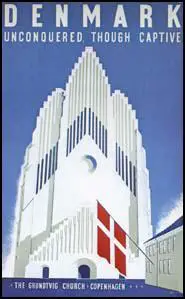Denmark

Denmark spent little on defence during the 1930s and when the German Army invaded on 9th April 1940 the armed forces were defeated on the first day. Most of the Danish merchant fleet escaped and sailed to Allied ports. Over the next four years 60 per cent of these ships were sunk by the German Navy and around 600 Danish sailors were killed transporting Allied supplies.
Unlike other occupied countries Denmark was able retain its monarchy. The Danish government expelled Allied diplomats, imposed strict press censorship, and in November 1941 signed the Anti-Comintern Pact.
Denmark was forced to supply Germany with food and raw materials. This created problems for the Danish economy and the country suffered from price inflation and the government was forced to impose food rationing.
Opposition to the German occupation grew and anti-Nazi newspapers began to appear in Denmark. The resistance helped nearly all Denmark's 8,000 Jews were helped to escape to Sweden and in 1943 the Freedom Council, an underground government, was established.
Denmark was liberated by Allied forces on 5th May 1945.
Primary Sources
(1) William Shirer, CBS Broadcast from Berlin (9th April, 1939)
The German occupation of Norway and Denmark, which the German newspapers tell us was done to safeguard their freedom and security, continues according to schedule, according to military circles in Berlin.
Denmark, which offered no resistance at all, was said to have been almost completely occupied by night-fall, that is - about two hours ago.
The situation in Norway is more obscure. The Germans admit that the Norwegians put up quite a little resistance at two places on the south coast - at Kristiansand and Oslo, the capital. Late in the afternoon, however, Berlin announced that Nazi troops had entered the Norwegian capital.
Incidentally, most of the Americans still in Berlin, especially our diplomats, had their families in Oslo. But there was no communication with the capital today, and their fate is unknown.
It's emphasized in Berlin that the German air force, which broke the back of Poland in less than a week, took a prominent part in today's action. What the navies are doing - the German and British - we don't know yet in Berlin. There is no news of any engagement, nor have the Germans had anything to say about the report that one of their transports, the Rio de Janeiro, was sunk.
Incidentally, the Wilhelmstrasse denies that Germany intends to make protectorates out of Denmark and Norway. The official contention here is, as I've said, that Germany had saved the freedom and the independence of these two neutral countries, and that's what the press drums on tonight.
(2) Manchester Guardian (10th April, 1940)
Almost within twelve hours of the invasion of Denmark and Norway yesterday the Germans had overrun the whole of Denmark and Oslo, the Norwegian capital, had fallen.
Late last night the Germans claimed that all points of military importance in Norway had been occupied. A German High Command communiqué said:
At the end of the day all bases of military importance in Norway are in German hands. Narvik, Trondhjem, Bergen, Stavanger, Kristiansamd, and Oslo are especially strongly occupied.
Where serious resistance was encountered - for instance, at Oslo and Kristlandsand - it was broken.
Norway's coastal fortifications, which were taken in close co-operation between the Navy Air Force, and Army shock troops, are now ready to repel any enemy attack.
There are, however, reports from other sources of Norwegian resistance. A Berlin broadcast last night admitted that the German High Command "has found it necessary" to bomb severely several cities and towns in Northern Norway.
Oslo was occupied by the Germans in the afternoon. They at once set up a "puppet" Government, under the leader of the Norwegian Nazi party, "to protect Norway's interests."
